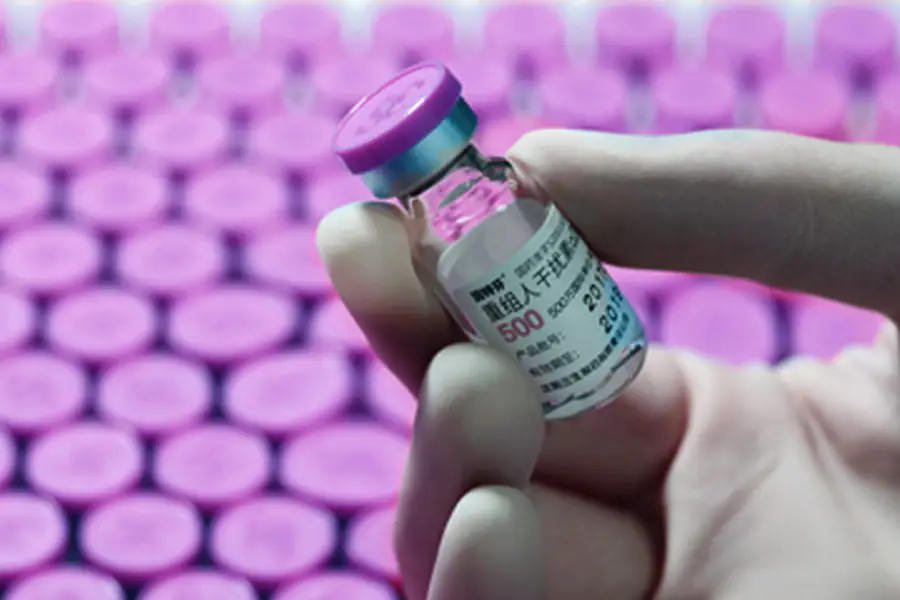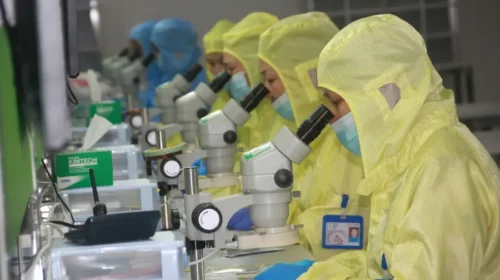3SBio hits the big time with $6 billion cancer drug deal

The pharma giant Pfizer has bought international rights to the experimental cancer therapy and will take a $100 million equity stake in the Chinese drug developer
Key Takeaways:
- The mega deal for rights to the Chinese biotech’s cancer drug drove 3SBio’s stock price to a seven-year high
- Big hopes are riding on “dual target” antibody treatments, with Merck & Co. teaming up with another Chinese biopharma on a similar product
By Molly Wen
China’s biopharma industry is celebrating a milestone moment after striking a giant licensing deal for one of its experimental cancer treatments.
Multinational drug giant Pfizer (PFE.US) has agreed to hand over an initial $1.25 billion (9 billion yuan) and up to $4.8 billion in milestone payments for international rights to the antibody drug candidate developed by China’s 3SBio Inc. (1530.HK).
The blockbuster payment marks the Chinese drug sector’s biggest overseas licensing deal to date, underscoring its growing role in developing transformative, targeted treatments for a range of cancers, often in partnership with big names in global pharma.
The 3SBio drug under development is a bispecific antibody that targets two protein pathways – PD-1 and VEGF – to fight lung and other cancers.
Under the deal, announced on May 20, Pfizer gains the opportunity to develop and sell the SSGJ-707 drug in markets outside of China. As well as securing record sums in upfront and other fees, the Chinese company stands to get a double-digit percentage of sales in the markets covered by the agreement.
As a further sweetener, Pfizer agreed to take a $100 million equity stake in 3SBio when the deal takes effect later this year, underlining the strategic nature of the relationship.
The news of the bumper deal lit a fire under the Chinese drug developer’s stock, which had rallied 13.81% on May 19 and surged another 32.28% the following day to HK$22, its highest level in seven years.
A 3SBiosubsidiary that will get30% of the Pfizer payments, Sunshine Guojian Pharmaceutical (Shanghai) (688336.SH), rose limit-up for four straight days between May 19 and May 22, more than doubling its share price. 3SBio had to rush out a risk statement reminding investors that the deal is still subject to review by the board of directors and approval by U.S. regulators, “subjecting the validity of the licensing agreement to some uncertainties”.
The company has been active in China’s pharmaceutical industry since 1993, developing several products that have become prominent drugs in their fields. These include treatments for anemia and other blood-related issues including TPIAO, EPIAO and SEPO, and mainland China’s first non-prescription product for hair loss, Mandi. The company’s revenues rose 16.5% in 2024 to 9.11 billion yuan from the prior year, while net profit jumped 34.9% to 2.09 billion yuan.
SSGJ-707 combines two anti-cancer functions, targeting the PD-1 immune checkpoint to strengthen the body’s innate defenses and the VEGF signaling pathway that regulates tumor growth.
Data from Phase Two clinical trials produced promising results on patients suffering from non-small cell lung cancer, both as a standalone treatment and combined with chemotherapy. The drug is also being tested for use against colorectal cancer and gynecological cancers.
Dual-action drugs in the spotlight
In the same category ofPD-1/VEGF treatments, only one bispecific antibody drug has been approved for use so far – ivonescimab from Akeso Biopharma (9926.HK). The drug fared well in a Phase Three trial against the monoclonal antibody Keytruda, an immunotherapy agent from Merck & Co. (MRK.US) that treats lung cancer by targeting the PD-L1 protein. The trial highlighted the potential of PD-1/VEGF bispecific antibodies to strengthen the immune system and attack cancer cells. Back in December 2022, Akeso Biopharma granted exclusive rights to develop and commercialize the drug in the United States, Canada, Europe and Japan to Summit Therapeutics.
Meanwhile Merck has been active in the same arena, gaining rights last November to another PD-1/VEGF candidate, LM-299, from Chinese drug developer LaNova Medicines. The Merck deal grants the Chinese company an upfront sum of $588 million and up to $2.7 billion in milestone payouts, far less than the Pfizer agreement with 3SBio.
Pfizer has been working on its own PD-1/VEGF research for some time. In February this year, Pfizer entered a clinical trial partnership with Summit Therapeutics to explore the combined use of ivonescimab with some of its own antibody drug conjugates to treat solid tumors.
3SBio also teamed up with Sichuan Biokin Pharmaceutical (688506.SH) in February this year for clinical trials on the use of SSGJ-707 combined with an antibody drug conjugate, EGFR/HER3, that targets proteins involved in tumor cell growth. The trial highlighted the potential of drug combinations to combat cancer by multiple means. Having secured the rights to the 3SBio drug, Pfizer may well accelerate clinical trials combining the new asset with its own therapies.
The timing for the push into new cancer therapies is also significant. Wanlian Securities noted in a recent research report that patents on many of Pfizer’s blockbuster drugs are approaching their expiry date, prompting the pharma giant to explore the rapidly growing R&D capability in the Chinese biotech industry. Chinese brands could be poised to attract more interest from “Big Pharma”, potentially leading to further collaborations and profit-sharing pacts.
3SBio currently trades at a price-to-earnings (P/E) ratio of 21 times, lagging the 49 times for Jiangsu Hengrui Pharmaceuticals (1276.HK; 600276.SH), which is also enjoying success with innovative drugs. The valuation gap suggests some upside potential for 3SBio, if the Pfizer partnership can contribute commercial expertise in launching new drugs as well as a considerable income stream.
To subscribe to Bamboo Works free weekly newsletter, click here




